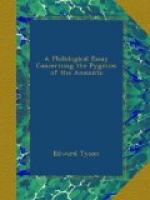This opinion had so fully obtained with me, that I never thought it worth the Enquiry, how they came to invent such Extravagant Stories: Nor should I now, but upon the Occasion of Dissecting this Animal: For observing that ’tis call’d even to this day in the Indian or Malabar Language, Orang-Outang, i.e. a Man of the Woods, or Wild-men; and being brought from Africa, that part of the World, where the Pygmies are said to inhabit; and it’s present Stature likewise tallying so well with that of the Pygmies of the Ancients; these Considerations put me upon the search, to inform my self farther about them, and to examine, whether I could meet with any thing that might illustrate their History. For I thought it strange, that if the whole was but a meer Fiction, that so many succeeding Generations should be so fond of preserving a Story, that had no Foundation at all in Nature; and that the Ancients should trouble themselves so much about them. If therefore I can make out in this Essay, that there were such Animals as Pygmies; and that they were not a Race of Men, but Apes; and can discover the Authors, who have forged all, or most of the idle Stories concerning them; and shew how the Cheat in after Ages has been carried on, by embalming the Bodies of Apes, then exposing them for the Men of the Country, from whence they brought them: If I can do this, I shall think my time not wholly lost, nor the trouble altogether useless, that I have had in this Enquiry.
My Design is not to justifie all the Relations that have been given of this Animal, even by Authors of reputed Credit; but, as far as I can, to distinguish Truth from Fable; and herein, if what I assert amounts to a Probability, ’tis all I pretend to. I shall accordingly endeavour to make it appear, that not only the Pygmies of the Ancients, but also the Cynocephali, and Satyrs and Sphinges were only Apes or Monkeys, not Men, as they have been represented. But the Story of the Pygmies being the greatest Imposture, I shall chiefly concern my self about them, and shall be more concise on the others, since they will not need so strict an Examination.
We will begin with the Poet Homer, who is generally owned as the first Inventor of the Fable of the Pygmies, if it be a Fable, and not a true Story, as I believe will appear in the Account I shall give of them. Now Homer only mentions them in a Simile, wherein he compares the Shouts that the Trojans made, when they were going to joyn Battle with the Graecians, to the great Noise of the Cranes, going to fight the Pygmies: he saith,[A]
[Greek: Ai t’ epei oun cheimona phygon, kai athesphaton ombron Klangae tai ge petontai ep’ okeanoio rhoaon ’Andrasi pygmaioisi phonon kai kaera pherousai.] i.e.




